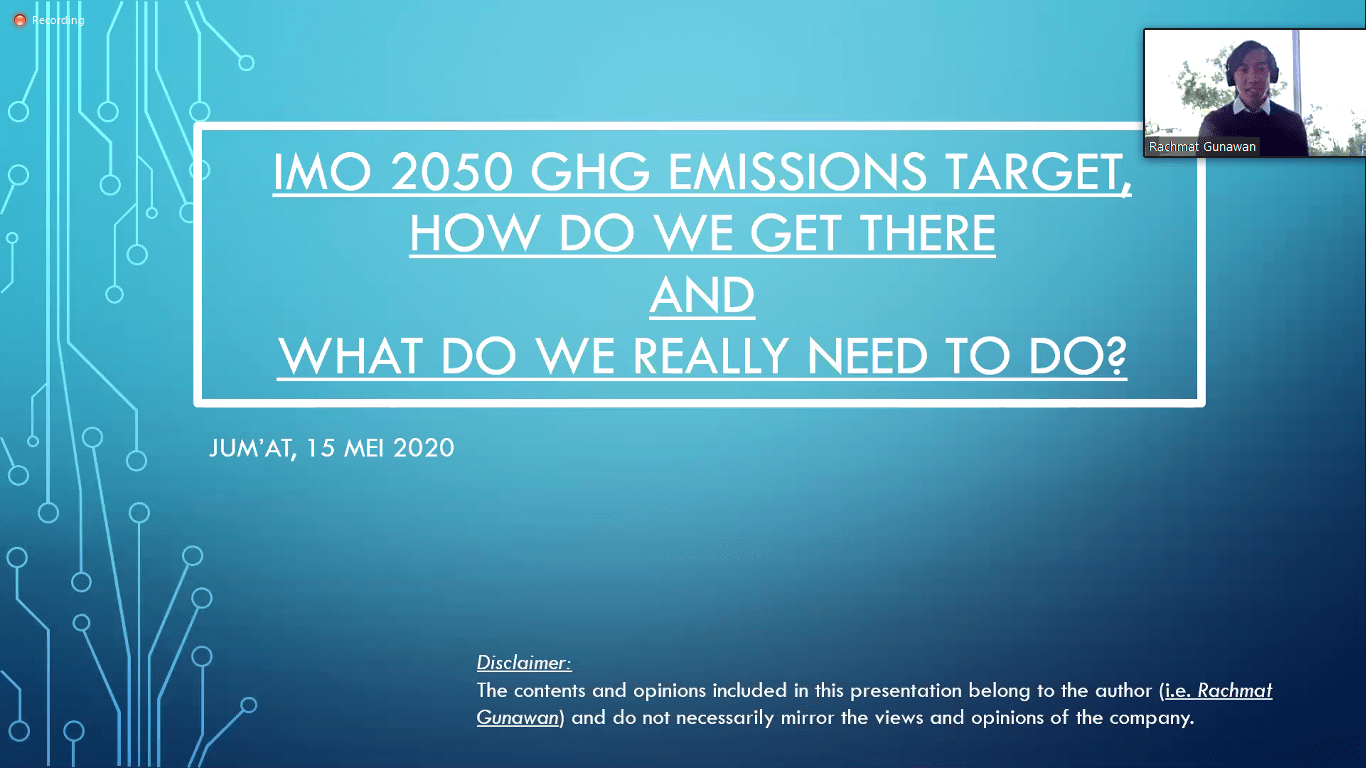Management of Green House Gas Emissions of International Sailing Ships

Lecture on “Current Research Issues of Global Marine Emission Towards 2050” that discusses the management of Green House Gas emissions of international sailing ships
ITS Campus, ITS News — In order to equip students with the latest issues in the aspects of shipping, maritime affairs, and their relation to the environment, the Department of Marine Engineering of Institut Teknologi Sepuluh Nopember (ITS) invited a guest speaker from the Bureau Veritas Group, Rachmat Gunawan, M.Sc. The guest lecture entitled “Current Research Issues of Global Marine Emission Towards 2050” was held online on Friday (15/5), which discussed the management of Greenhouse Gas emissions of international sailing ships.
Rachmat, as he is familiarly called, explained that international sailing ships cannot be separated from the increasing amount of exhaust emissions produced by their ship engines. Exhaust gases such as nitrogen oxides (NOx), carbon monoxide (CO), hydrocarbons (HC), and sulfur oxides (SOx) are known to cause health and environmental problems. “The concern on the increasing effect of greenhouse gases of international sailing ship activities has become a glaring issue for the world,” he emphasized.
This man who is an Energy Efficiency Specialist at Bureau Veritas Group revealed that a study conducted by the International Maritime Organization (IMO) in 2014 estimated that international sailing ships emitted 796 million tons of carbon dioxide (CO2) in 2012.
Furthermore, this amount of CO2 contributed around 2.2 percent to the total global anthropogenic CO2 emissions. “This study also confirmed that emissions from international sailing ships can grow between 50 to 250 percent in 2050 mainly due to the growth of world maritime trade,” he stated.
In efforts of dealing with this prominent problem, IMO encouraged improvements in energy efficiency and developed strategic steps to reduce ship emissions. “Since 2013, IMO has set two standards in ship fuel economy. Both are known as the Energy Efficiency Design Index (EEDI) and the Ship Energy Efficiency Management Plan (SEEMP).” continued this alumnus of the ITS Marine Engineering Department.

Rachmat Gunawan, M.Sc., when presenting his lecture material entitled “Current Research Issues of Global Marine Emission Towards 2050” that discusses the management of Green House Gas emissions of international sailing ships
Going deeper into the topic, Rachmat elaborated that EEDI required new vessels to comply with the minimum mandatory energy efficiency performance level, then increase over time through various phases. Meanwhile, SEEMP established a mechanism for ship owners to improve the energy efficiency of their vessels. “In this case, operational steps are implemented, such as weather routing, optimization of trim and speed, timeliness of arrival at ports and others,” he conveyed.
This alumnus of Ecole Centrale de Nantes France explained that IMO committedly strives to reduce the total annual greenhouse gas emissions from international sailing ships by at least 50 percent by 2050, compared to 2008. “IMO also issued a policy of limiting fuel with a sulfur content not exceeding 0.5 percent, such as listed in MARPOL 73/78 Annex VI article 14,” he specified.
As an official member of the IMO, who also ratified MARPOL 73/78 Annex VI, Rachmat expressed that the Indonesian government was obliged to implement this policy in this matter. In response to this, the Indonesian government issued a regulation on Indonesian flagged vessels weighing 5000 gross tonnages (GT) or more to include planning for the data collection on fuel consumption in SEEMP. “As well as the obligation for ships to have a Compliance Data Collection Plan Confirmation,” he identified.
Lastly, Rachmat hoped that the greenhouse gas emission reduction policies established by the IMO together with the governments in several countries can help reduce overall fuel consumption. Including emissions and losses incurred in the long term. “Of course, all parties from the government, industry, academic institutions, and even ourselves must work smartly and effectively to achieve this goal,” he concluded. (sin/lut/ory)
Related News
-
ITS Lecturer Introduces Madurese Culture to the International Stage
ITS Campus, ITS News — Continuing to show local wisdom to the world community, this time a lecturer from the Department
May 20, 2020 23:05 -
ITS Researchers Remind TKDN is Crucial for Economic Independence
ITS Campus, ITS News — The Domestic Component Level (TKDN) is the key to restoring the glory of the Indonesian
May 20, 2020 23:05 -
Strengthening Quality Education, ITS Professor Develops Adaptive Technology for Students
ITS Campus, ITS News — Differences in students’ abilities in understanding lessons are often a challenge for teachers in the classroom.
May 20, 2020 23:05 -
ITS Graduates Create Reverse Logistics Model for PET Plastic Waste Recycling
ITS Campus, ITS News — Doctoral graduate from the Department of Industrial and Systems Engineering, Sepuluh Nopember Institute of Technology (ITS) Dr. Yuniar
May 20, 2020 23:05
